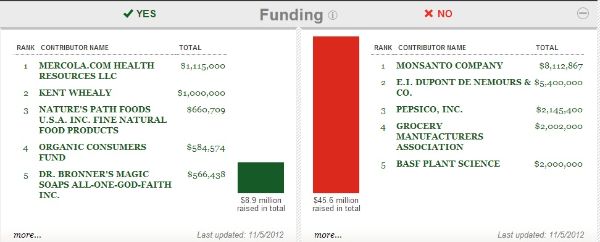Credit: PR Web
Proposition 37 is trailing and unlikely to pass. With 23% of precincts reporting, the measure is failing 43% to 57%. Greatest support for the measure has come from the Central and Northern Coastal regions of the state, but seem insufficient to outpace the No votes coming from the rest of the state.
Prop 37 would have given Californians a better knowledge of the food they consume, according to some estimates, "40 to 70 percent of food products sold in grocery stores in California contain some genetically engineered ingredients." If Prop 37 had passed, California would have been the first State to regulate the consumption of Genetically Modified Organisms (GMOs).
The primary consequences of Prop 37 would have been the following:
- Food, either raw or processed, that had been genetically modified would have had to have been clearly labeled with as "Genetically Engineered."
- The labeling requirement would not have been applicable to organic food, most animal products, alcoholic beverages or food sold for immediate consumption (for example, that sold in a restaurant)
- Food manufacturers would have been obligated to abide by the labeling requirement within 18 months of the passage of the proposition.
- Food manufacturers would have been able to chose where to put the label.
- Food containing any genetic material could not have been labelled "natural."
- Consumers would have had the right to sue manufacturers for mislabeling.
Studies have shown that most Americans are in favor of food labeling and Californians were no exception as polls showed that Prop 37 was favored by more than 60% of Californians. However, in the month leading up to the election, support for the measure began to slide as the heavily funded No on Prop 37 campaign launched a highly focused campaign. The Yes on 37 campaign focused their messaging on the right to know what you eat and emphasized that if 61 countries around the world presently require labeling, so should California. The No campaign, funded by major producers of genetically engineered seeds and food manufacturers attacked the proposition for being poorly written and the potential costs that would be borne by consumers.
Prop 37 is a perfect example of a race where money was the major factor in the proposition's defeat, and as the Yes campaign, although well funded as compared to other propositions could not come close to matching the investments made by the likes of Monsanto, Dupont, Pepsico, and other multi-million dollar donors.


